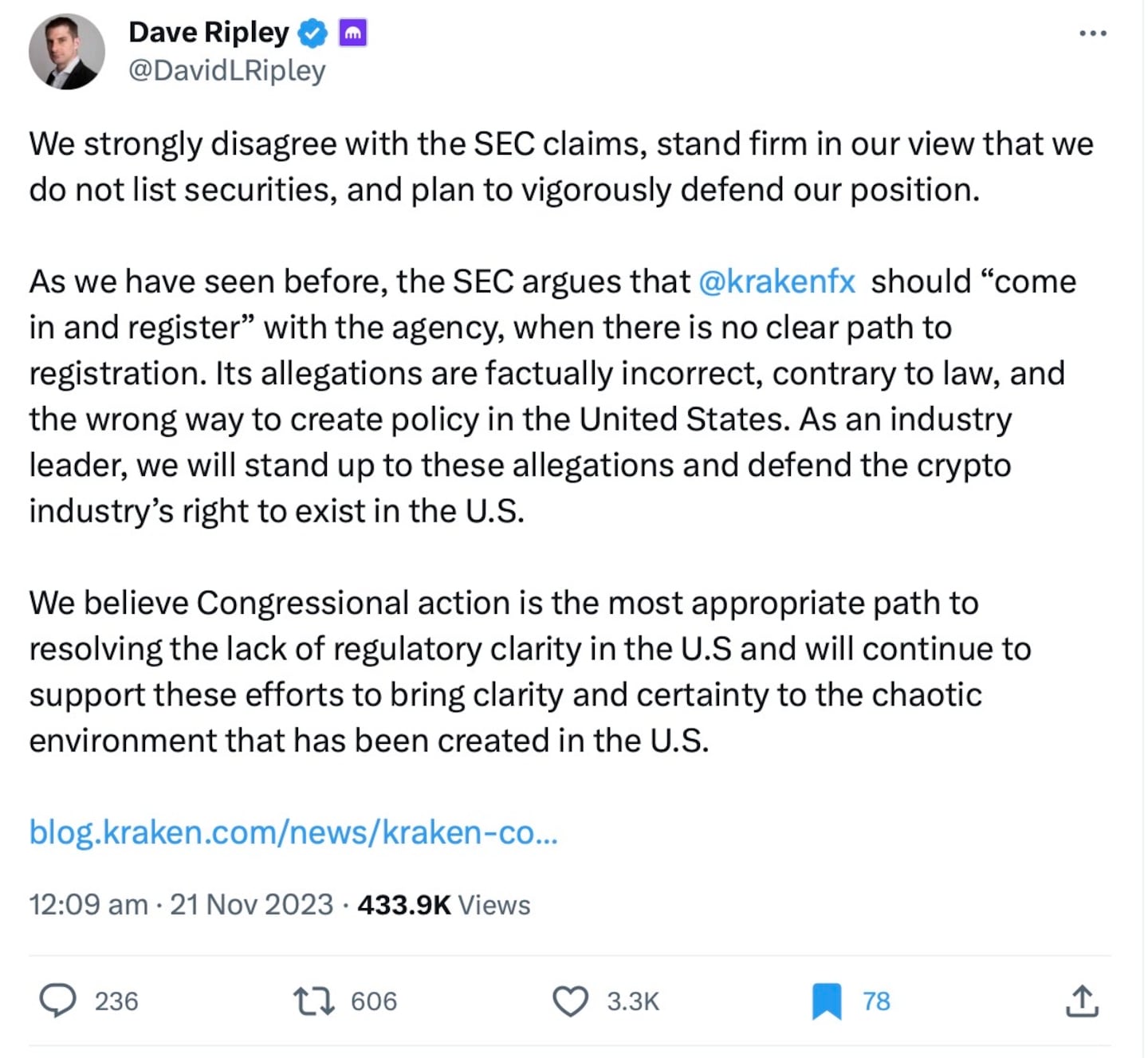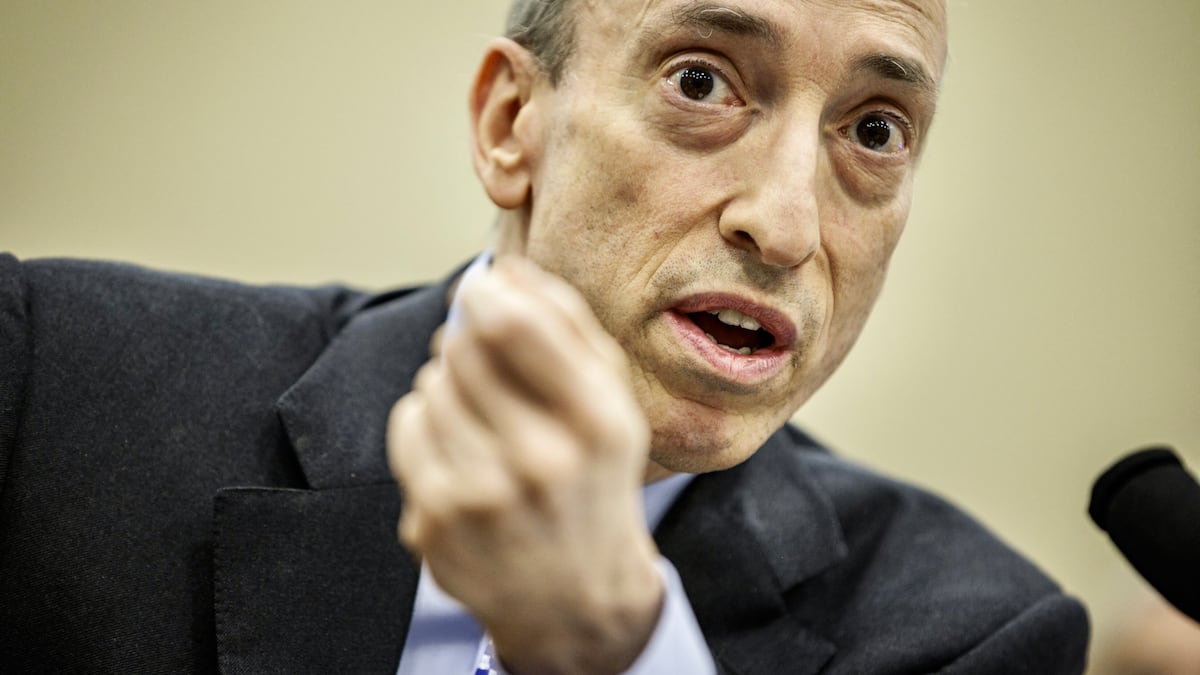- Co-mingling of user funds was one of the factors that led to the collapse of FTX and the conviction of its CEO Sam Bankman-Fried.
- The SEC says Kraken raked in billions in customer revenue while failing to protect investors.
- The markets watchdog has filed similar suits against Binance and Coinbase.
One of the criminal things FTX did was to mingle its own assets with those of customers in its sister hedge fund Alameda Research.
Famously, this blew up in founder Sam Bankman-Fried’s face — it led to the exchange’s collapse and his criminal conviction.
The US Securities and Exchange Commission this week made another case involving co-mingling of company and customers assets. In a lawsuit filed Monday, It accused Kraken, the cryptocurrency exchange, of raising risks for customers by violating one of the most fundamental rules in finance.
Significant risk
The SEC said Kraken sometimes held as much as $33 billion in crypto assets for its customers, and $5 billion in cash.
Yet Kraken co-mingled those assets with its own, creating what an independent auditor called “a significant risk of loss to its customers,” the complaint said.
Kraken also allegedly paid expenses from accounts that held customer cash.
And in 2023, the exchange’s auditor found that poor record-keeping resulted in “material mistakes” to its financial statements in 2020 and 2021, the lawsuit said.
Co-mingling customer money with company assets is a violation of sound business practices in virtually every type of financial enterprise.
“Defendants have placed their own financial interests ahead of the legal obligations they owe to customers as securities intermediaries,” the SEC said in the civil suit.
The SEC alleged that Kraken’s “deficient internal controls and inadequate record keeping” created risks for customers and would be prohibited in a registered exchange or broker-dealer.
The agency’s lawsuit seeks a civil fine, disgorgement of ill-gotten gains, and a halt to acting as an exchange without registering.
Similar lawsuits
The lawsuit is levelled against Kraken’s parent company Payward Ventures.
The SEC accuses Payward of illegally operating as a broker dealer, a clearing agency, and an exchange without registering with the agency.
These charges are the same as those the SEC brought against Binance and Coinbase in similar lawsuits earlier this year
On Monday, Kraken CEO David Ripley denied the SEC’s allegations.

“We strongly disagree with the SEC claims, stand firm in our view that we do not list securities, and plan to vigorously defend our position,” he said on X.
In a statement on its website, Kraken said, “The SEC cannot and does not allege that any customer funds are missing, or any loss has occurred. Nor does it allege that any loss will occur. The complaint itself concedes that this so-called ‘commingling’ is no more than Kraken spending fees it has already earned.”
The civil action comes after the SEC settled a prior case with Kraken in February.
The exchange agreed to discontinue its staking-as-a-service programme after the SEC said the exchange had unlawfully failed to register it under federal securities laws.
Kraken paid $30 million disgorgement and penalties.
Registering like TradFi firms
The new lawsuit demonstrates that the SEC and its hard-charging chair, Gary Gensler, remain committed on holding crypto firms responsible for complying with securities laws.
As a result, they are demanding that crypto companies register the same as any traditional brokerages and exchanges do.
A handful of digital assets businesses have trodden that path. However, few registered broker-dealers offer significant trading in digital assets and focus mainly on tokenised versions of traditional assets.
Crypto leaders such as Coinbase CEO Brian Armstrong and the Blockchain Association, the industry’s lobbying group, reject the argument that digital assets, and companies that offer them, are subject to the same laws that govern stocks and bonds.
Ripley agrees. In his tweet Monday, he said the SEC had not set up a clear path to registration.
Like Armstrong, he called on Congress to develop and pass a law that recognises the special properties of cryptocurrencies and treats them differently than traditional securities.
“We will continue to support efforts to bring clarity and certainty to the chaotic environment that has been created in the US,” he tweeted.
Senator Cynthia Lummis, a Republican from Wyoming who supports crypto, threw her support behind Kraken.
In a tweet on Tuesday, she said the SEC should stop “ruling by enforcement.”
She called for Congress to pass a new regulatory framework for the industry.
Intertwined functions
The SEC’s cases against Kraken, Coinbase, and Binance bring up another important issue — how these companies intertwine different market functions.
Under US law, broker-dealers that offer securities trading to customers aren’t allowed to combine the functions of an exchange with those of a clearing agent or custodian.
This is designed to protect customers from the conflicts of interest that arise when these functions are mingled in one entity.
The law also protects investors from the risks involved in mingling customer assets with their own.
Kraken, however, allegedly took in billions of dollars in fees and trading revenue — the business recorded $42 billion in sales in 2021 alone — from investors without recognising these investor protection measures, the lawsuit said.
And Payward Ventures has never registered with the SEC in any capacity.
Got a tip about Kraken, regulation or another story? Reach out to the author at joanna@dlnews.com.







